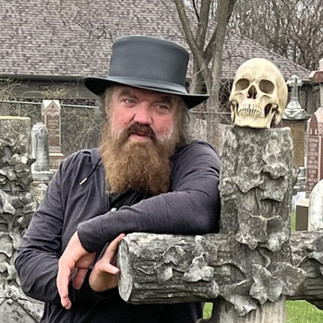“GOD OF THE DEAD” by Rosetta West
- Levi

- Jul 28, 2025
- 2 min read

A stormy leap forward in Rosetta West’s evolution, God of the Dead is a bold, unruly 15-track journey through haunted soundscapes and flashes of fierce clarity. Rooted in the raw soul of Illinois blues-rock but reaching far beyond, the album reshapes genre boundaries—melding blues, punk, folk, psychedelia, and pure distortion into a sprawling, shape-shifting epic. In contrast to the taut focus of their previous EP, Gravity Sessions, this release sprawls with restless purpose. At its heart is Joseph Demagore—founder, songwriter, and spiritual anchor—whose weathered, commanding voice carries the weight of lived experience, guiding each track like a ritual, more invocation than song.
Whether cloaked in layers of guitar or stripped back to solitary piano, Demagore’s songwriting evokes a restless spirituality—grappling with mortality, memory, and the sacred woven into the fabric of everyday life. The album’s momentum is largely driven by its rhythm section: drummers Mike Weaver and Nathan Q. Scratch alternate throughout the record, each lending a distinct character to the tracks. Guest drummer Caden Cratch injects raw intensity into the opener, while longtime bassist Orpheus Jones anchors the entire album with steady, unshakable presence. Louis Constant makes a haunting appearance on the final track, lending cinematic weight to the album’s somber conclusion. Rosetta West leans into risk with clear intent—one track taps into folk-inflected ritual, another charges ahead with punk urgency, while an elegiac piano ballad holds the listener in quiet suspension. Even the instrumental centerpiece thrums with meaning, serving as a spectral passage between sonic realms.
Though vast in scope, God of the Dead maintains a striking emotional cohesion. Each track feels intentional—a deeper descent into a landscape shaped by grief, defiance, and the search for something beyond. Its power doesn't stem from consistency, but from an unwavering commitment to storytelling and emotional authenticity. This isn't background music or an easy listen; it demands attention, stillness, and full presence. Rosetta West doesn’t chase trends or fit neatly into sonic molds. Instead, they deliver something primal—part ritual, part revelation—crafted from fire and soul, leaving an impact that lingers long after the final note fades..

















Comments